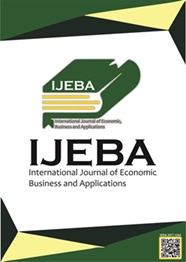The Influence of Learning Motivation and Class Climate on Character of Students Entrepreneurs in Vocational School Ekatama Pekanbaru
Abstract
Keywords
Full Text:
PDFReferences
Ana Iolanda Vodă, Nelu Florea. (2019). Impact of Personality Traits and Entrepreneurship Education on Entrepreneurial Intentions of Business and Engineering Students. International Journal of Sustainability 2019, 11, 1192. Interdisciplinary-Humanities and Social Sciences Research Department, Alexandru Ioan Cuza University of Ias, i, Lascăr Catargi Street, No. 54, 700107 Ias¸i, Romania. Email: yolanda.voda@gmail.com.
Atikah, Hermansyah. 2016. Contribution of the Implementation of Entrepreneurship Learning and Social Interaction on the Entrepreneurial Character of Student Learners 1 Pekanbaru. Thesis. S2 Riau University.
Arikunto, Suharsimi. 2006. Research Procedure A Practical Approach. Jakarta: Rineka Cipta.
B Lena Nuryanti S and A Jajang W. Mahri. 2010. Education Model for Life Skills Development Based on the Entrepreneurial Spirit. http://file.upi.edu/Directory/Proceeding/UPI-UPSI/2010/Book_5/Model_Education_Development_Course_Life_Life_Berlandaskan_Jiwa_Kentirausaha.PDF. Accessed March 20, 2017.
Dewi Permata Sari, Rusmin, Deskoni. 2018. The Effect of Class Climate on Students' Learning Motivation in Tanjung Raja's Sman3. Journal of Profit Volume 5, Number 1, May 2018.
Erni.2017. Character Building of Student Entrepreneurship Through Scout Extracurricular Activities at SMP Negeri 7 Tualang District, Siak Regency. Economic and Business Education Journal, Vol. 9, No. 1, March 2017. Riau University.
Hamza. B. Uno. 2012. Motivation Theory and Measurement. Jakarta: Earth Literacy.
Muhammad Abdul Ghofur. 2013. Credibility and Authenticity of Entrepreneurship Teachers on the Entrepreneurship Character of State Vocational School Students in Surabaya. Journal of Educational Economics and Entrepreneurship, Vol 1, No. 1 of 2013. Yos Soedarso University, Surabaya.
Ratlan Pardede and Renhard Manurung. Path Analysis. Jakarta: Rineka Cipta.
Rhenald Khasali, et al. 2010. Strata Entrepreneurship Module 1. Yogyakarta: Mizan Media Utama.
Sardiman, A.M. 2010. Interaction and Motivation for Teaching and Learning. Jakarta: PT Raja Grafindo.
DOI: http://dx.doi.org/10.31258/ijeba.4.1.10-17
Refbacks
- There are currently no refbacks.





.png)
.png)
.png)


